
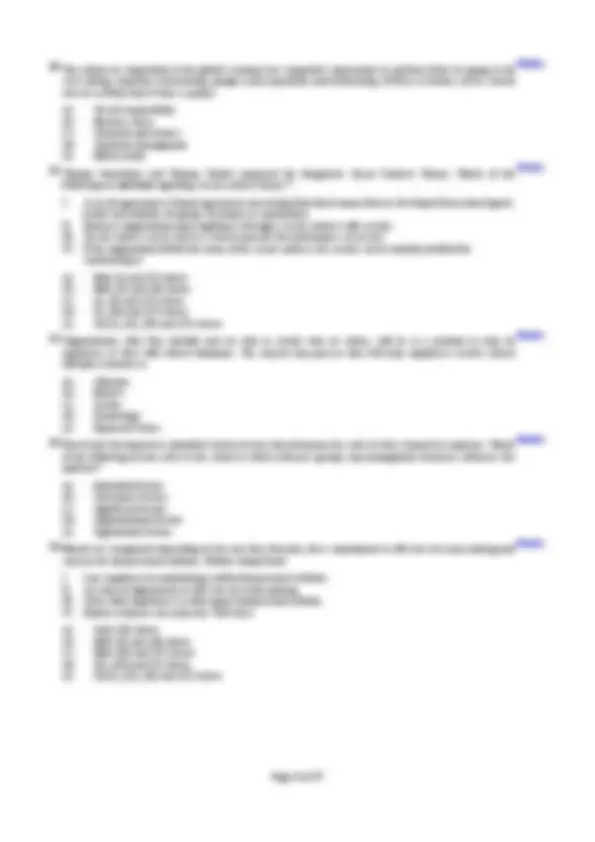
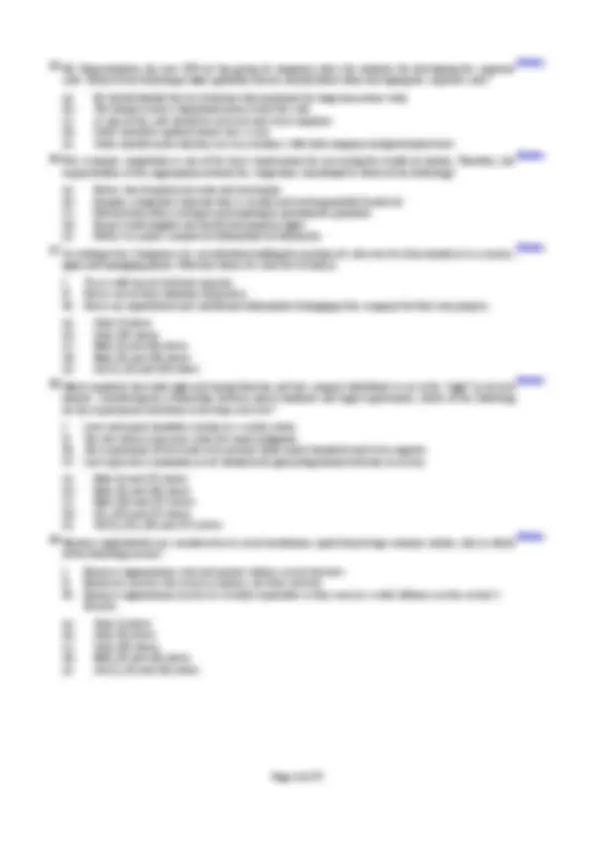
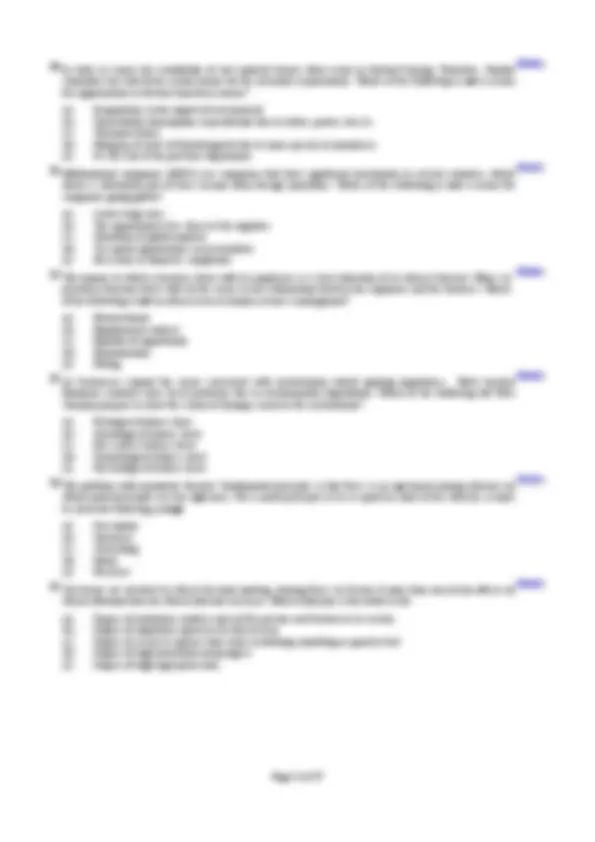
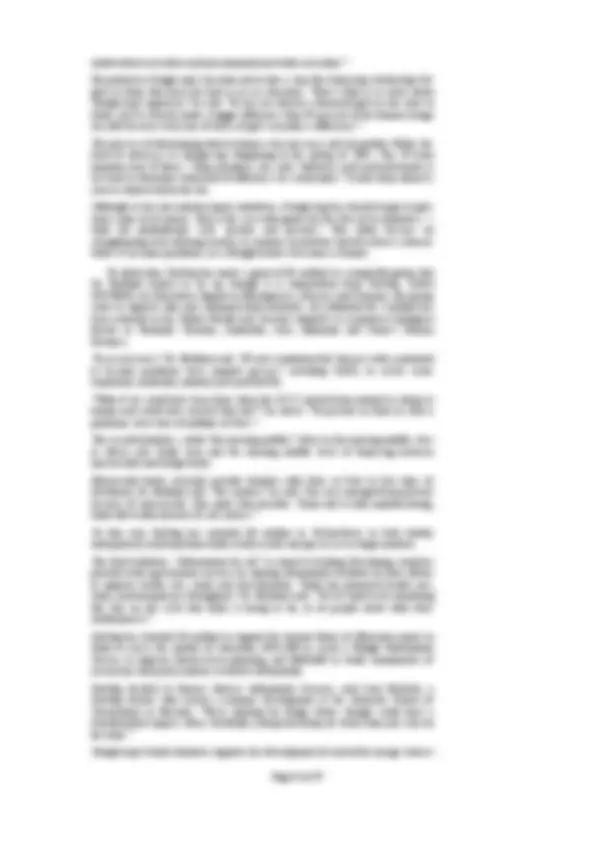
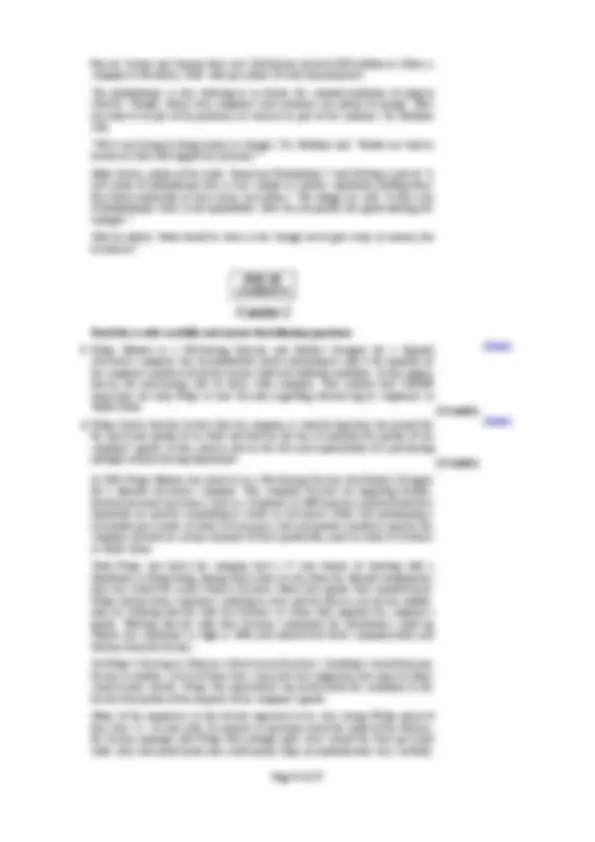
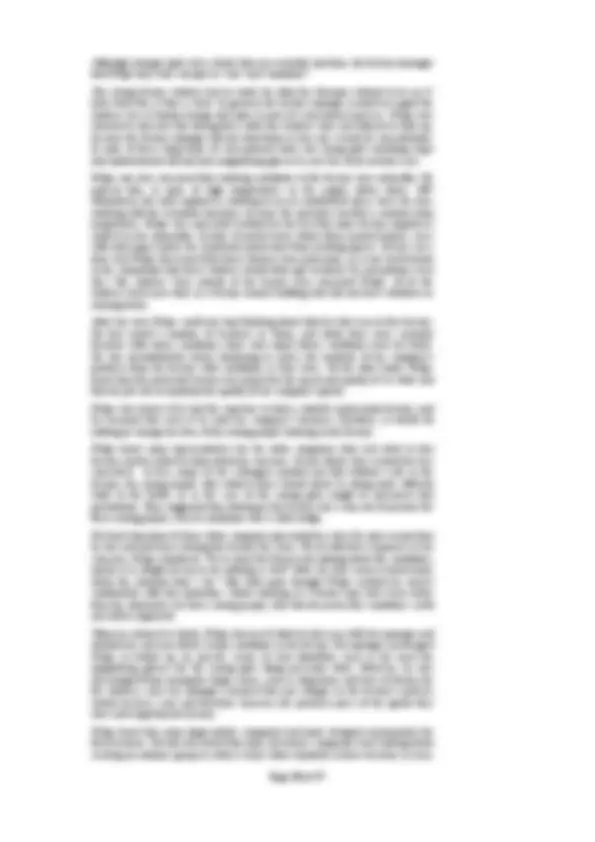
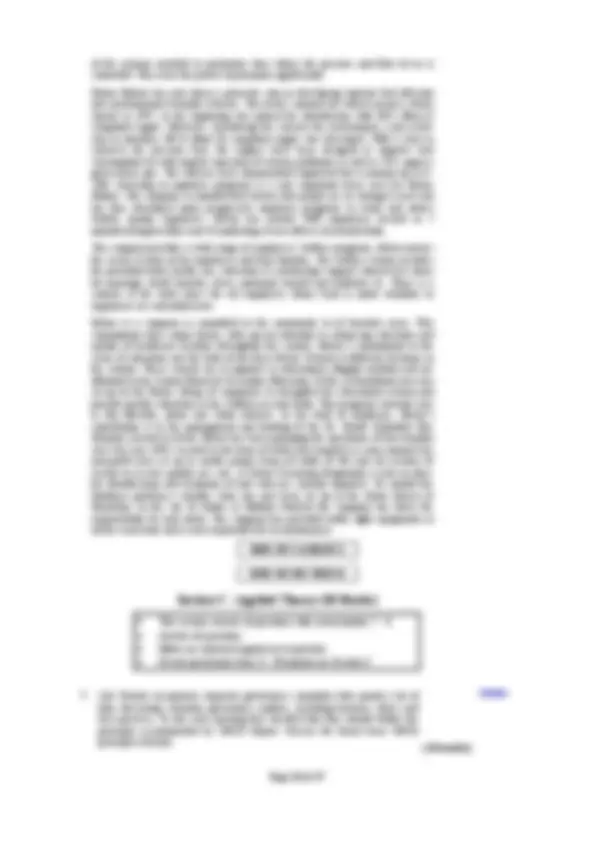

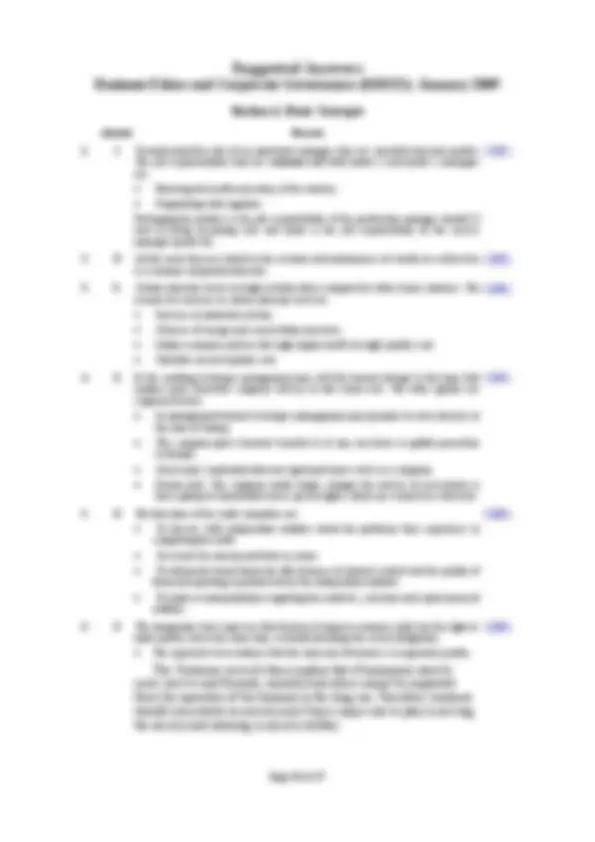
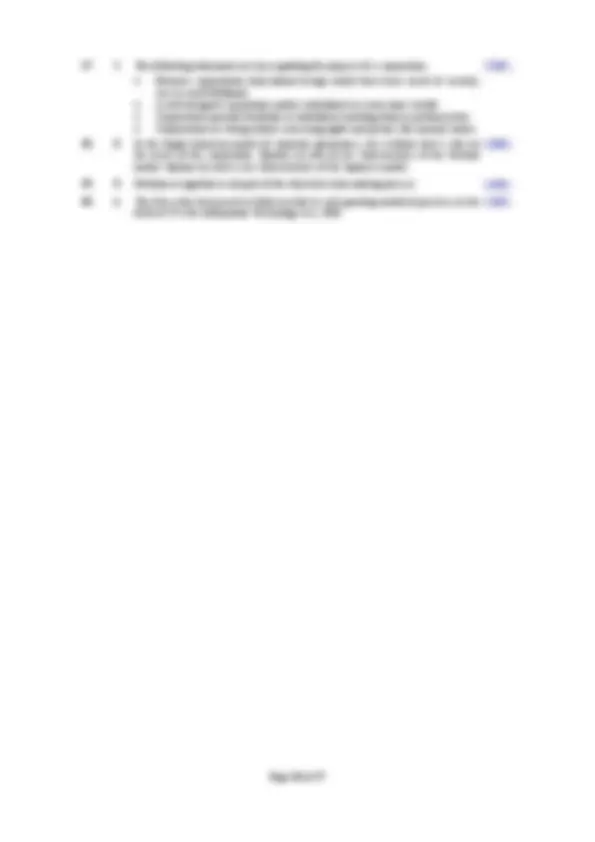
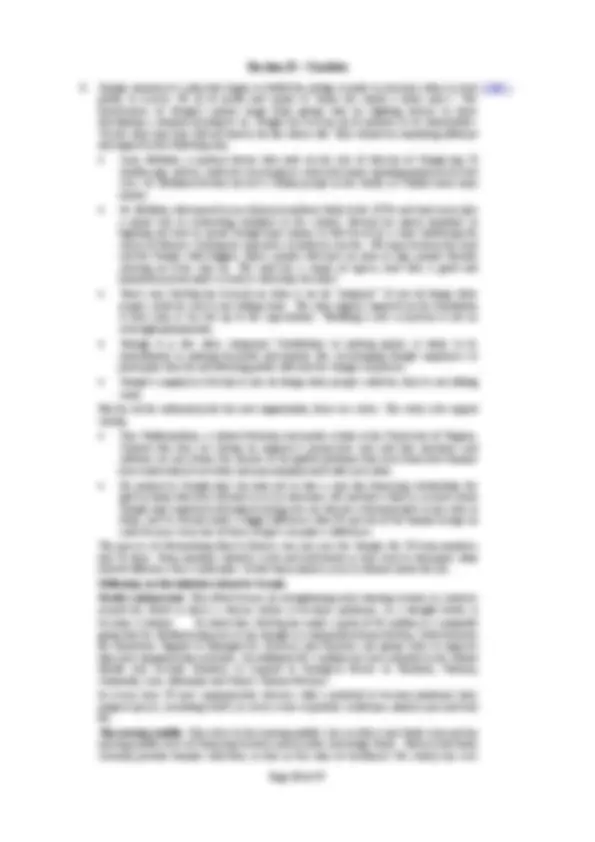
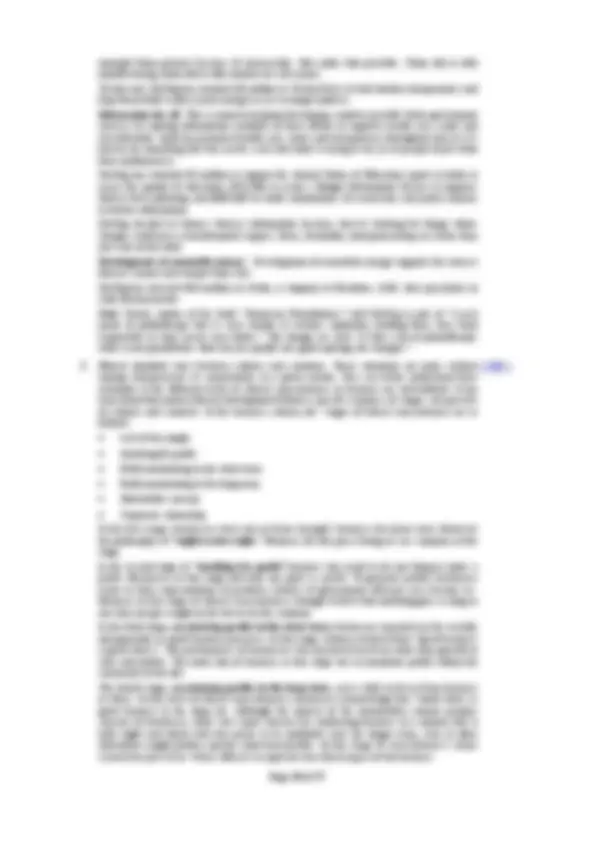
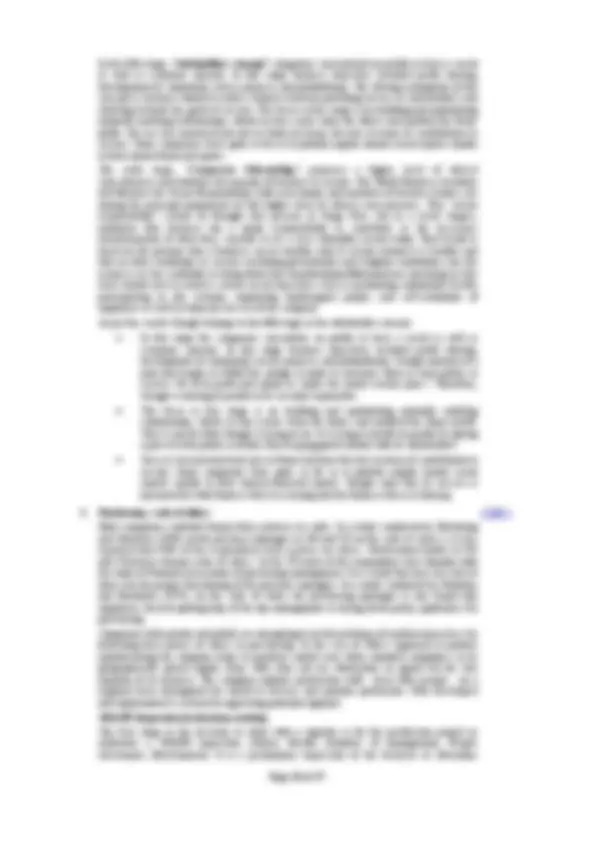
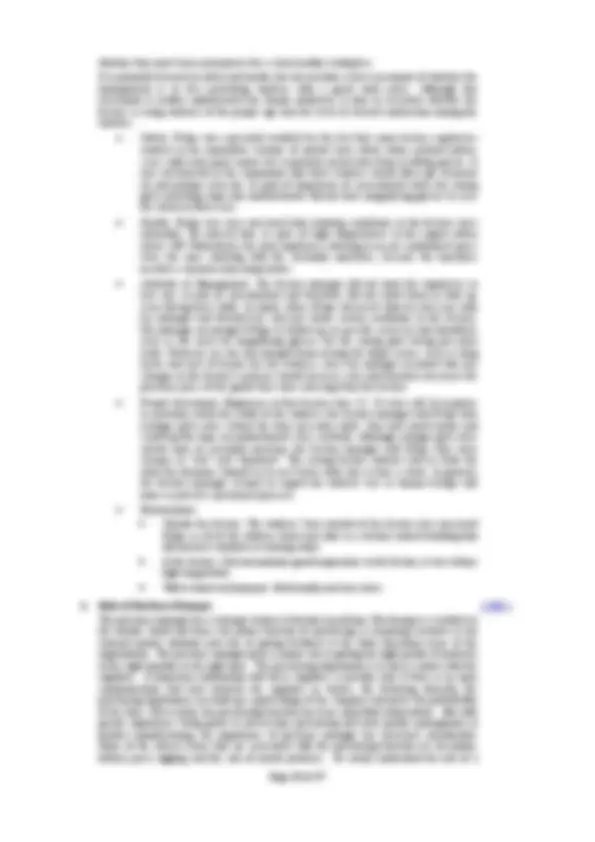
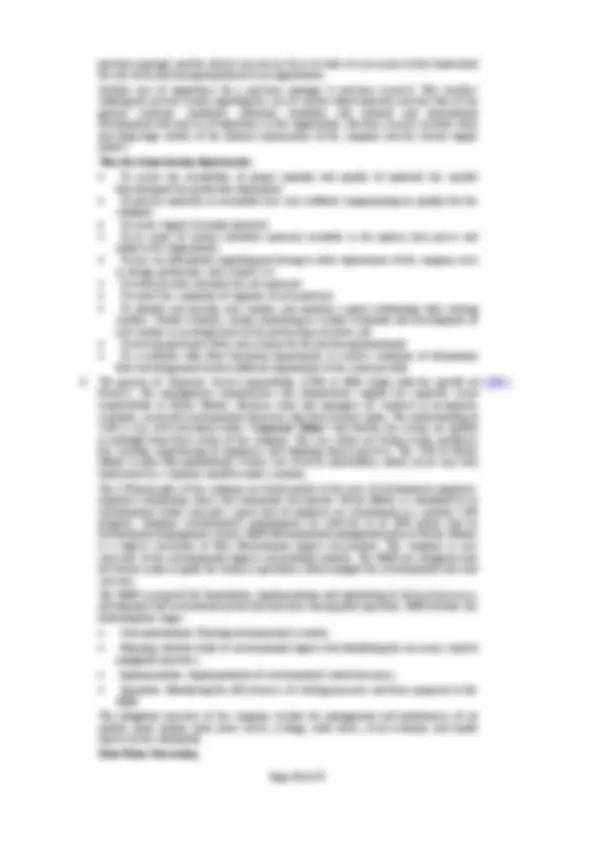
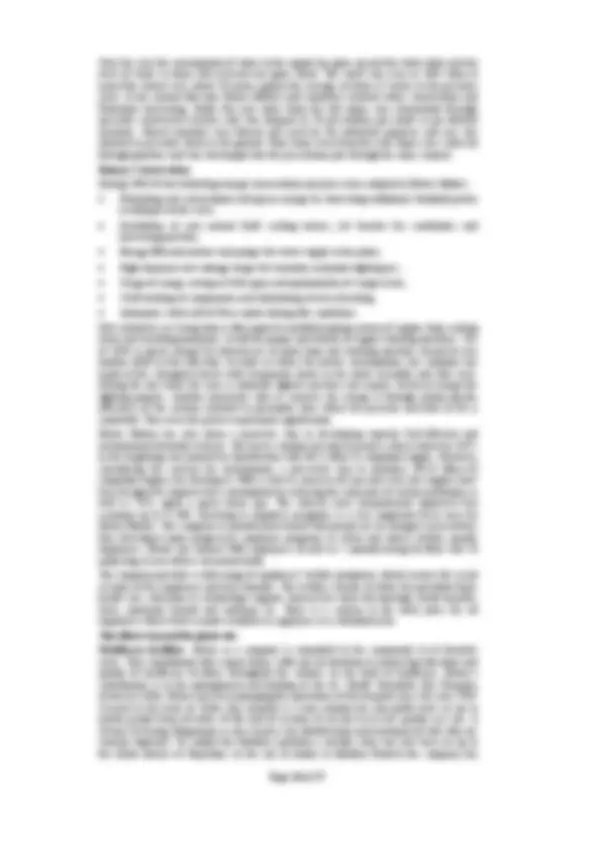
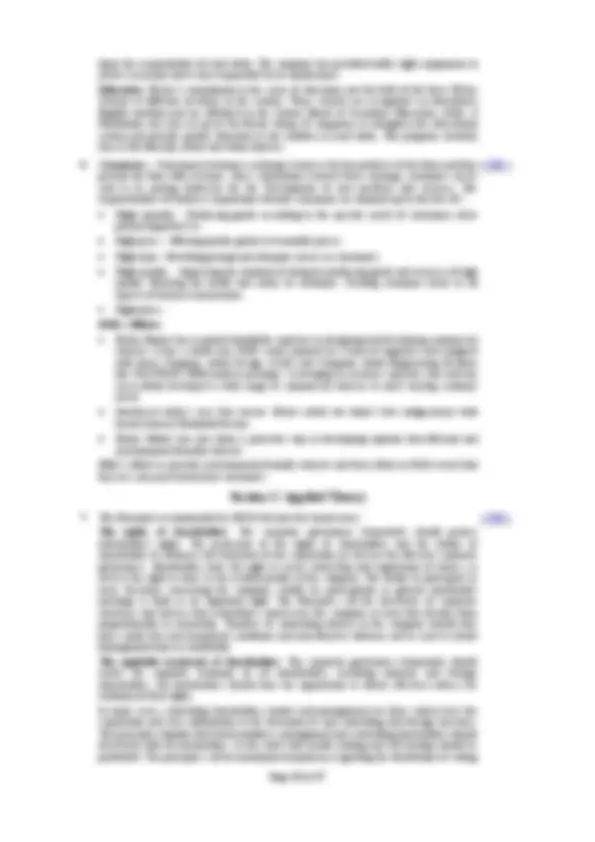
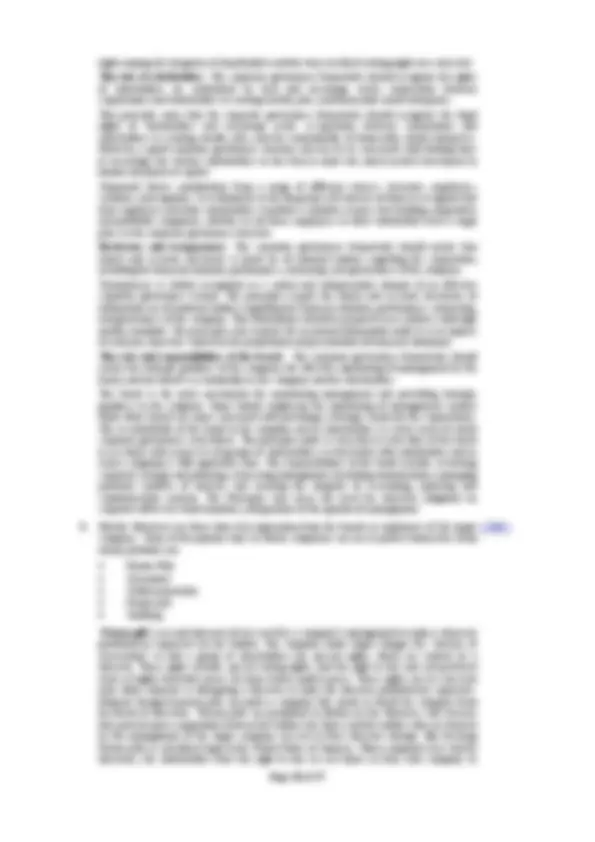
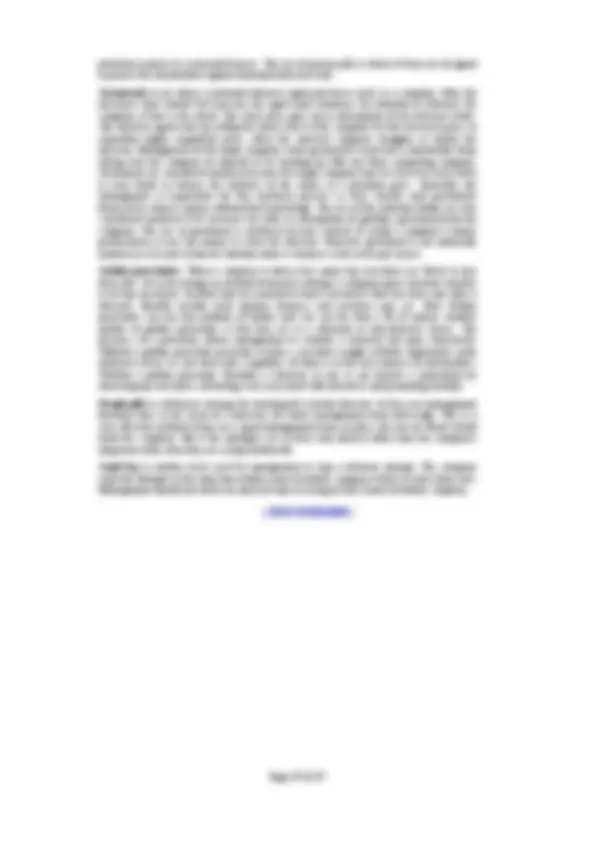


Study with the several resources on Docsity

Earn points by helping other students or get them with a premium plan


Prepare for your exams
Study with the several resources on Docsity

Earn points to download
Earn points by helping other students or get them with a premium plan
Community
Ask the community for help and clear up your study doubts
Discover the best universities in your country according to Docsity users
Free resources
Download our free guides on studying techniques, anxiety management strategies, and thesis advice from Docsity tutors
The stages of ethical consciousness in business and the implementation of corporate social responsibility (csr) at eicher motors ltd. The company's commitment to being an environmental leader and its focus on environmental programs are highlighted. The four stages of eicher motors' csr program are conceptualization, planning, implementation, and operation. The document also mentions the establishment of a foundation to strengthen education in rural india.
Typology: Study notes
1 / 27

This page cannot be seen from the preview
Don't miss anything!




















This section consists of questions with serial number 1 - 30. Answer all questions. Each question carries one mark. Maximum time for answering Section A is 30 Minutes.
1. (^) The most important task of an operations manager is making efficient use of materials, capacity and knowledge
available to achieve an output of the desired quality and quantity. To understand the various roles of an operations manager, they are classified into two models. Which of the following job responsibilities is/are common with both model 1 and model 2 managers?
I. Receiving incoming calls and mails. II. Ensuring the health and safety of the workers. III. Packaging the product. IV. Negotiating with suppliers.
(a) Only (IV) above (b) Both (I) and (III) above (c) Both (II) and (IV) above (d) (I), (II) and (III) above (e) All (I), (II), (III) and (IV) above.
2. (^) The effectiveness of an organization nowadays depends on its ability to develop itself into a social organization.
As a result, organizations have evolved overtime to perform a number of functions or tasks in society. Which of the following tasks of organizations is related to creation and maintenance of wealth?
(a) Financial tasks (b) Economic and production tasks (c) Maintenance tasks (d) Adaptive tasks (e) Social tasks.
3. (^) Carbon intensity levels are high in India when compared to other Asian countries. Which of the following is/are
the reason(s) for increase in carbon intensity level?
I. Increase in industrial activity. II. Absence of energy and conservation measures. III. Indian economic policies like low import tariffs on high-quality coal. IV. Subsidies on low-quality coal.
(a) Only (II) above (b) Only (III) above (c) Both (I) and (IV) above (d) (I), (II) and (IV) above (e) All (I), (II), (III) and (IV) above.
4. (^) Hostile takeovers are those that elicit opposition from the boards or employees of the target company.
Management uses many techniques to protect themselves from the unruly predator. In this regard, which of the following is true regarding sandbag technique?
(a) Management may promote its own interests at the time of biding (b) The company gives lucrative benefits to its top executives (c) A potential takeover agent purchases stock in a company (d) The company under target, changes the articles of association so that a group of shareholders have special rights, which are evoked by a takeover (e) Management may stall the buyout attempt in the hope that another more favorable company will try to take them over.
i. e x e
5. (^) The board relies on independent outside directors to monitor management performance. In order to do so the
board sets up various committees such as audit committee. Which of the following in not a function of the audit committee?
(a) Make recommendations regarding the audit fee, selection and replacement of auditors (b) Select the new non-executive directors (c) Review the interim and final accounts (d) Inform the board about the effectiveness of internal control and the quality of financial reporting as pointed out by the independent auditors (e) Discuss with independent auditors about the problems they experience in completing the audit.
6. (^) Talcott Parsons proposed a view called the integration view of ethics. In this context, which of the following
statements is/are false?
I. It expresses that business being an economic entity has the right to make profits, but at the same time, it should discharge the social obligations. II. It implies that if businesses want to exist, survive and flourish, morality and ethics cannot be separated from the operation of the business in the long run. III. It endorses that the only aim of business is to generate profits.
(a) Only (I) above (b) Only (II) above (c) Only (III) above (d) Both (I) and (III) above (e) Both (II) and (III) above.
7. (^) Accounting is defined as, “the process by which any business keeps track of its financial activities by recording
its debits and credits and balancing its accounts.” Which of the following is/are true regarding accounting?
I. It provides a system of rules and principles, which govern the format, and content of financial statements. II. By adhering to the principles and practices in the system of an organization, it can provide fair and accurate reporting of the financial position of a business. III. The ethical issues surrounding accounting practices are under reporting income, falsifying documents, illegally evading income taxes and engaging in fraud.
(a) Only (I) above (b) Only (III) above (c) Both (I) and (III) above (d) Both (II) and (III) above (e) All (I), (II) and (III) above.
8. (^) Different social laws of states and nations that govern occupational safety and environmental standards is an
example of
(a) Law of economies (b) Company law (c) Law of the jungle (d) Law of conservation of energy (e) Industrial law.
9. (^) Which of the following implies, adopting the norms of the country, in which an organization operates its
business?
(a) Stakeholder theory, strategy and ethics (b) Loyalty contract (c) Psychological contract (d) Cultural relativism (e) Leveraged buy-outs.
15. Mr. Ramachandran, the new CEO of Spa group of companies takes the initiative for developing the corporate
code. Which of the following is not a guideline that he should follow when developing the corporate code?
(a) He should identify the key behaviors that maximize the long-term owner value (b) The human resource department must review the code (c) A copy of the code should be sent each and every employee (d) Codes should be updated atleast once a year (e) Codes should ensure that they are in accordance with both company and government laws.
16. Fair economic competition is one of the basic requirements for increasing the wealth of nations. Therefore, the
responsibilities of the organization towards the competitors should not be which of the following?
(a) Foster closed markets for trade and investment (b) Promote competitive behavior that is socially and environmentally beneficial (c) Refrain from either seeking or participating in questionable payments (d) Respect both tangible and intellectual property rights (e) Refuse to acquire commercial information by dishonesty.
17. According to the Companies Act, an individual holding the position of a director of a firm should act as a trustee,
agent and managing partner. Fiduciary duties of a director include(s)
I. To act with best of skill and expertise. II. Not to exceed their authority and powers. III. Not to use unpublished and confidential information belonging to the company for their own purpose.
(a) Only (I) above (b) Only (III) above (c) Both (I) and (III) above (d) Both (II) and (III) above (e) All (I), (II) and (III) above.
18. Moral standards deal with right and wrong behavior and law compels individuals to act in the “right” or desired
manner. Considering the relationship between moral standards and legal requirements, which of the following are the requirements laid down to develop a fair law?
I. Laws and moral standards overlap to a certain extent. II. The law always represents collective moral judgment. III. The requirement of law tends to be positive while moral standards tend to be negative. IV. Law represents a minimum set of standards for generating human behavior in society.
(a) Both (I) and (IV) above (b) Both (II) and (III) above (c) Both (III) and (IV) above (d) (II), (III) and (IV) above (e) All (I), (II), (III) and (IV) above.
19. Business organizations are considered to be social institutions, apart from being economic entities, due to which
of the following reasons?
I. Business organizations exist and operate within a social structure. II. Businesses need to win social acceptance, for their survival. III. Business organizations need to be socially responsible as they exercise a wide influence on the society’s lifestyle.
(a) Only (I) above (b) Only (II) above (c) Only (III) above (d) Both (II) and (III) above (e) All (I), (II) and (III) above.
20. In order to ensure the availability of raw material buyers often resort to forward buying. Therefore, Tandon
committee has laid down certain norms for the inventory requirements. Which of the following is not a reason for organizations to deviate from these norms?
(a) Irregularities in the import of raw material (b) Unavoidable interruptions in production due to strikes, power cuts etc. (c) Transport delays (d) Piling up of stock of finished goods due to some special circumstances (e) It’s the role of the purchase department.
21. Multinational companies (MNCs) are companies that have significant investments in several countries, which
derive a substantial part of their income from foreign operations. Which of the following is not a reason for companies going global?
(a) Lower wage rates (b) The opportunity to be closer to the suppliers (c) Saturation of global markets (d) To exploit opportunities in new markets (e) Recession or domestic completion.
22. The manner in which a business deals with its employees is a clear indication of its ethical character. Ethics in
personnel function deals with all the issues in the relationship between the employee and the business. Which of the following is not an ethical issue in human resource management?
(a) Retrenchment (b) Employment contract (c) Equality of opportunity (d) Remuneration (e) Hiring.
23. As businesses expand the issues concerned with environment started gaining importance. Most western
European countries have faced problems due to environmental degradation. Which of the following did West Germany prepare to show the extent of damage caused to the environment?
(a) Ecological balance sheet (b) Anxiological balance sheet (c) Eco-centric balance sheet (d) Deontological balance sheet (e) Psychological balance sheet.
24. The problem with normative theories’ fundamental principle is that there is no agreement among ethicists on
which moral principles are the right ones. For a moral principle to be accepted by most of the ethicists, it must be all of the following, except
(a) Descriptive (b) Universal (c) Overriding (d) Public (e) Practical.
25. Six factors are involved in ethical decision-making. Among these six factors if more than one-factor affects an
ethical dilemma then the ethical intensity increases. Ethical intensity is described as the
(a) Degree of minimum conduct expected by persons and businesses in society (b) Degree of importance given to an ethical issue (c) Degree of social acceptance that exists in defining something as good or bad (d) Degree of high innovation and progress (e) Degree of high legal protection.
Read the caselet carefully and answer the following questions:
1. DotOrg is part of a new mode of philanthropy that is very similar to venture capitalism, holding those they fund responsible in ways never seen before. In this light, analyze why Google wanted to adopt a new mode of philanthropy to “make the world a better place” and also explain the initiatives taken by DotOrg. ( 8 marks)
2. Explain the stages of ethical consciousness in business. Also, discuss in which stage Google can be placed and why. ( 9marks)
Google announced a plan that begins to fulfill the pledge it made to investors when it went public to reserve 1% of its profit and equity to “make the world a better place.” The beneficiaries of Google’s money range from groups that are fighting disease to those developing a commercial plug-in car.
The company’s philanthropy — Google.org, or DotOrg as Googlers call it — will spend up to $175 million in its first round of grants and investments over the next three years, Google officials said. While it is like other companies’ foundations in making grants, but it will be untraditional in making for-profit investments, encouraging Google employees to participate directly and lobbying public officials for changes in policies, company officials said.
Google may be one of America’s 10 richest corporations as measured by market value, but its budget for philanthropy is minuscule compared with the $70 billion of the Bill and Melinda Gates Foundation.
Still, Google’s founders, Sergey Brin and Larry Page, expressed a hope back in 2004 that “someday this institution may eclipse Google itself in terms of overall world impact.” What it lacks in size, though, Google.org may make up in cachet.
Larry Brilliant, a medical doctor who took on the role of director of Google.org 18 months ago, said he could not even begin to count how many spending proposals he had seen. “There are 6.5 billion people in the world,” Dr. Brilliant said in a recent interview, “and in the last 18 months I’ve met 6.4 billion, all of whom want, if not some of our money, then some of the Google pixie dust.”
Dr. Brilliant, who moved to an ashram in northern India in the 1970s and went on to play a major role in eradicating smallpox in the country, likened his moral quandary in figuring out how to spend Google.org’s money to that faced by a saint wandering the streets of Benares.
“There are 500 steps between the road and the Ganges,” he said. “On every step are beggars, lepers, people who have no arms or legs, people literally starving. The saint has a couple of rupees; how does a good and honorable person make a resource allocation decision? Do you weigh a hand that’s missing more than a leg? Someone who’s starving versus a sick child? In a much less dramatic way, that’s what the last 18 months have been for us.”
DotOrg has focused on what it can do “uniquely,” said Sheryl Sandberg, vice president for global online sales and operations at Google, who, like all employees, is permitted to spend 20 percent of her time at the foundation or in other charitable ventures. “If you do things other people could do, you’re not adding value.”
The only urgency imposed on the foundation is how soon it can live up to the expectations. “Building a new ecosystem is not an overnight phenomenon,” Dr. Brilliant said. “Here at Google if you have a project, you press Send. We won’t work that quickly.”
But for all the enthusiasm for the new organization, there are critics. “It’s wonderful that this company is devoting massive resources to fixing big world problems, but they are taking an engineer’s perspective to them,” said Siva Vaidhyanathan, a cultural historian and media scholar at the University of Virginia. “Machines and software are not always the answer. Global problems arise from how humans have
undervalued each other and miscommunicated with each other.”
He pointed to Google.org’s decision not to take a step like financing scholarships for girls in India who have not had access to education. “That’s what is so naïve about Google.org’s approach,” he said. “If you can educate a thousand girls in one state in India, you’ve already made a bigger difference than 99 percent of the human beings on earth because every one of those of girls can make a difference.”
The process of determining what to finance was not easy, said Jacquelline Fuller, the head of advocacy at Google.org. Beginning in the spring of 2007, “the 20 team members had 20 ideas.” Team members, she said, “debated, cried and held hands as we tried to determine what kind of difference we could make.” It took them almost a year to winnow down the list.
Although it was just announcing its initiatives, Google.org has already begun to give away some of its money. That is the case with grants for the first of its initiatives — what the philanthropy calls “predict and prevent.” This effort focuses on strengthening early warning systems in countries around the world to detect a disease before it becomes pandemic, or a drought before it becomes a famine.
To attain that, DotOrg has made a grant of $5 million to a nonprofit group that Dr. Brilliant helped to set up, though it is independent from DotOrg. Called INSTEDD, for Innovative Support to Emergencies, Diseases and Disasters, the group seeks to improve data and communication networks. An additional $2.5 million has been awarded to the Global Health and Security Initiative to respond to biological threats in Thailand, Vietnam, Cambodia, Laos, Myanmar and China’s Yunnan Province.
“In recent years,” Dr. Brilliant said, “39 new communicable diseases with a potential to become pandemic have jumped species,” including SARS, or severe acute respiratory syndrome; monkey pox and bird flu.
“What if we could have been there when the H.I.V. moved from animal to chimp to human and could have averted that risk?” he asked. “To prevent or abort or slow a pandemic saves tens of millions of lives.”
The second initiative, called “the missing middle,” refers to the missing middle class in Africa and South Asia and the missing middle level of financing between microcredits and hedge funds.
Microcredit funds currently provide families with three or four or five days of livelihood, Dr. Brilliant said. “No country,” he said, “has ever emerged from poverty because of microcredit. Jobs make that possible. China did it with manufacturing, India did it with outsourced call centers.”
To that end, DotOrg has awarded $3 million to TechnoServe to find worthy entrepreneurs and help them build credit records and get access to larger markets.
The third initiative, “information for all,” is aimed at helping developing countries provide better government services by making information available on their efforts to improve health care, roads and electrification. “India has promised health care, work, and transparency throughout,” Dr. Brilliant said. “Yet it’s hard to do something like this on the scale that India is trying to do, to let people know what their entitlement is.”
DotOrg has awarded $2 million to support the Annual Status of Education report in India to assess the quality of education; $765,000 to create a Budget Information Service to improve district-level planning, and $660,000 to build communities of researchers and policy makers to deliver information.
DotOrg decided to finance literacy information because, said Lant Pritchett, a DotOrg adviser who teaches economic development at the Kennedy School of Government at Harvard, “We’re looking for things where Google could have a transformative impact. Ideas, flexibility, entrepreneurship are better than just cash on the table.”
Google.org’s fourth initiative supports the development of renewable energy sources
Although younger girls were slower than an assembly machine, the factory manager told Felipe they were cheaper to “run” and “maintain”.
The young factory workers had to work for what the foreman claimed to be an 8- hour work day, 6 days a week. In general, the factory manager seemed to regard the workers less as human beings and more as part of a mechanical process. Felipe was shocked to discover that during their shifts the workers were not allowed to look up, because the factory manager did not want them to lose one second of concentration. In spite of these long hours of concentrated work, the young girls installing chips into motherboards did not have magnifying glasses to ease the strain on their eyes.
Felipe was also concerned that working conditions in the factory were unhealthy. He noticed that, in spite of high temperatures in the region (often above 100º Fahrenheit), the only employees working in an air-conditioned space were the ones working with the assembly machines, because the machines needed a constant room temperature. Felipe was especially troubled by the fact that some factory employees worked in the immediate vicinity of melted lead, while others painted plastic cases with only paper masks for respiratory protection from resulting gasses. (In fact, on a later visit Felipe discovered that these workers were paid more, as it was well-known in the community that these workers would often get seriously ill, and perhaps even die.) The workers’ lives outside of the factory also concerned Felipe: all of the workers lived next door in a factory-owned building that did not have windows or running water.
After his visit, Felipe could not stop thinking about what he had seen at this factory. He had visited a number of factories in China, and while there were certainly factories with worse conditions, there were many where conditions were far better. He was uncomfortable about continuing to source the majority of his company’s products from the factory with conditions as they were. On the other hand, Felipe knew that this particular factory was prized for the speed and quality of its work and that his job was to maintain the quality of his company’s goods.
Felipe was unsure if he had the expertise to find a suitable replacement factory, and he reasoned that even if he took his company’s business elsewhere, it would do nothing to change the lives of the young people working in the factory.
Felipe knew some representatives for the other companies that sent work to this factory, and he talked to them about his concerns. On the whole, they seemed far less concerned. In fact, many of his colleagues pointed out that without a job in the factory, the young people who worked there would likely be doing more difficult work in the fields, or in the case of the young girls, might be pressured into prostitution. They suggested that working in the factory was a way out of poverty for these young people, even if conditions were a little rough.
He knew that many of these other company representatives were far more senior than he was and had been visiting this factory for years. Faced with their responses to his concerns, Felipe wondered, “If it is okay for them to do nothing about the conditions, maybe it is alright for me to do nothing as well? After all, they seem to know more about the situation than I do.” But with more thought Felipe realized he wasn’t comfortable with this mentality—while working in a factory may have been better than the alternative for these young people, that did not mean that conditions could not still be improved.
When he returned to Spain, Felipe discussed what he had seen with his manager and detailed his concerns about certain conditions in the factory. His manager encouraged Felipe to follow up on specific issues he had identified, such as the need for magnifying glasses for the young girls doing precision work. However, he was discouraged from raising the larger issues, such as long hours and lack of breaks for the workers, since his manager reasoned that any changes in the factory’s policies would increase costs and therefore increases the purchase price of the goods they were sourcing from the factory.
Felipe knew that some larger public companies had more stringent requirements for their factories. He had also heard that some electronics companies were talking about creating an industry group to enforce better labor standards in their factories in Asia.
However, most of these companies were placing orders on a much larger scale than his company (often working as the exclusive client of large factories, unlike his company, which worked with factories that were serving a variety of different clients), and he suspected his management wouldn’t want to get involved in issues that might ultimately raise prices. He did find out, however, that his company had a small charitable fund that focused on providing micro-finance loans to women in India.
Still, as a junior member of the staff, Felipe was concerned about pressing this issue. He could tell that his manager considered the discussion over, and going above his head seemed like a bad idea. Felipe was also concerned that he could undermine his credibility in the company or be branded as too naïve. However, when he thought about things he had seen in China, he felt guilty and sad, even when he tried to tell himself that this was just the reality of the world. He wants to act prudent and effective.
END OF CASELET 2
Read the caselet carefully and answer the following questions:
5. The genesis of Corporate Social responsibility (CSR) at Eicher Motors Ltd. (EML), began with the growth of business. Discuss. (^) ( 9 marks)
6. The CSR at Eicher Motors is more than philanthropy. It takes care of all its stakeholders, which can be very well understood by their corporate initiative. In this context, discuss the responsibilities of corporate towards their consumers and justify whether EML is fulfilling its responsibility towards its consumers. (^) ( 6 marks)
Eicher Motors Ltd. (EML), belonging to the Eicher group, is a leading Commercial Vehicle (CV) manufacturer, with a significant presence in the 6 to 9 ton segment. It has a market share of 33% in this segment. Recently, the company has decided to enter the medium/ heavy commercial vehicle segment. Recognizing the need for an "environment friendly vehicle", EML has developed a new engine compliant with Bharat 2001 norms in collaboration with AVL of Austria.
Eicher Motors has acquired formidable expertise in designing and developing commercial vehicles. It has a world-class R&D centre manned by a team of engineers and equipped with latest Computer Aided Design (CAD) and Computer Aided Engineering facilities like NASTRAN, FEM analysis packages. Leveraging its in-house expertise, this unit has successfully developed a wide range of commercial vehicles to meet varying customer needs.
The inception of Eicher goes back to the year 1948, when the Goodearth Company was set-up to sell and service imported tractors in India. Slowly and steadily the company started gaining a strong hold in the Indian market. The Eicher Tractor Corporation of India Private Ltd. was incorporated on April 24, 1959. It was a company formed in technical collaboration with the reputed Gebr. Eicher of Germany. This was a very critical phase in the company’s history, since the idea was not only to come out with Eicher’s first tractor, but India’s very first tractor. The consistent efforts of Eicher towards indigenous manufacture of tractors were rewarded on September 3, 1960, when Eicher rolled out India’s first indigenously built tractor from its Faridabad factory.
The genesis of Corporate Social responsibility (CSR) at EML began with the growth of business. The company has undergone numerous changes since its inception, based on mergers and acquisitions and a growing realization of the environmental impacts of a large automotive company.
The management communicates and demonstrates support for CSR at Eicher Motors. Business units and managers are required to incorporate economic, social and environmental objectives into their business plans. The understanding of CSR is very well articulated under “ corporate Values ” and thereby the actions are guided accordingly from those values of the company: The core values are being secular,
of the systems installed in pneumatic lines where the pressure and flow of air is controlled. This saves the power requirement significantly.
Eicher Motors has also taken a proactive step in developing superior fuel-efficient and environmental friendly vehicles. The heavy commercial vehicle project, which started in 1997, in the beginning was planed for introduction with BS-I (Euro-I) compliant engine. However, considering the concern for environment, a pro-active step to introduce BS-II (Euro-II) compliant engine was developed. With a view to conserve the precious fuel, the engines have been designed to improve fuel consumption by reducing the emissions of various pollutants as well as CO2, again a green house gas. The vehicles have demonstrated improved fuel economy up to 8- 10%. Investing in employee programs is a very important focus area for Eicher Motors. The company as manufacturer knows that people are its strongest asset and has thus developed many progressive employee programs to retain and attract skilled, quality employees. Eicher has around 5000 employees located in 5 manufacturing facilities and 56 marketing & area offices all around India.
The company provides a wide range of employees’ welfare programs, which ensures the social security of the employees and their families. The welfare scheme includes the provident fund, health care, education & scholarships support, interest free loans for marriage, death benefits, leave, maternity benefit and uniforms etc. There is a canteen at the work place for all employees where food is made available to employees at a subsidized rate.
Eicher as a company is committed to the community in its broadest sense. This commitment takes many forms, with special attention to enhancing education and quality of healthcare facilities throughout the country. Eicher’s commitment to the cause of education saw the birth of the three Eicher Schools at different locations in the country. These schools are recognized co-educational, English medium and are affiliated to the Central Board of Secondary Education, Delhi. A Foundation was also set up by the Eicher Group of companies to strengthen the educational system and provide quality education to the children in rural India. This program currently runs in Rai Bareilly, Alwar and Solan districts. In the field of healthcare, Eicher’s contribution is in the management and funding of the Dr. Shroff Charitable Eye Hospital, located in Delhi. Eicher has been managing the operations of this hospital since the year 1996. Located in the heart of Delhi, this hospital is a non-commercial, non-profit trust set up to enable people from all walks of life and all sections of society to receive quality eye care. A School Screening Programme is also in place for identification and treatment of kids who are visually impaired. To combat the blindness problem a satellite clinic has also been set up in the Alwar district of Rajasthan. In the city of Indore in Madhya Pradesh the company has taken the responsibility of road safety. The company has provided traffic light equipments at all the crossroads and is also responsible for its maintenance.
END OF CASELET 3
This section consists of questions with serial number 7 - 8. Answer all questions. Marks are indicated against each question. Do not spend more than 25 -30 minutes on Section C.
7. Lily Textiles incorporate corporate governance committee that spends a lot of time discussing corporate governance matters, including business ethics and best practices. In one such meeting they decided that they should follow the principles recommended by OECD Report. Discuss the broad areas OECD principles fall into. ( 10 marks)
8. Arun Motors is ready to takeover Vishnu Motors. Mr. Feroz, the manager of Vishnu Motors is worried about the impact this is going to create. Therefore Mr. Feroz and a group of employees are looking for ways in which to protect themselves from the unruly predator. Explain the various techniques Mr. Feroz can use to protect the company. ( 10 marks)
7. E Accounting provides a system of rules and principles, which govern the format, and content of financial statements. By adhering to the principles and practices in the system of an organization, accounting can provide fair and accurate reporting of the financial position of a business. The ethical issues surrounding accounting practices are: under reporting income, falsifying documents, allowing or taking questionable deductions, illegally evading income taxes and engaging in fraud.
< TOP >
8. A Different social laws of states and nations that govern occupational safety and environmental standards is an example of law of economies.
< TOP >
9. D Cultural relativism implies adopting the norms of the country in which an organization operates its business.
< TOP >
10. C The enhanced competition in the global economy has compelled corporations to perform belter by going in for cost-cutting, corporate restructuring, mergers and acquisitions and downsizing. All these activities can be carried out successfully only if there is proper corporate governance.
< TOP >
11. D Thomas Donaldson and Thomas Dunfee proposed the Integrative Social Contract Theory. A social contract is an informal agreement concerning behavioral norms that are developed from shared goals, beliefs and attitudes of groups of people or communities. Donaldson held that 'business organizations gain legitimacy through a social contract with society. According to Donaldson, a productive organization is one, which ensures customer satisfaction and protects the interests of its workers, and thereby enhances the welfare of the society of which it is a part. He argues that social contract can be used as a tool to measure the performance of productive organizations. If the organization fulfills the terms of the contract, it has performed well. If it does not, then society is morally justified in condemning it.
< TOP >
12. B^ The step-by-step process that will help employees resolve ethical dilemma is known as believe.
< TOP >
13. C^ Ferrell and Gresham have identified various factors that determine the code of ethics framed by marketer. Significant factors refer to the extent to which reference groups, top management and peers influence the marketer.
< TOP >
14. C Boards are categorized depending on the way they function, their commitment to effective decision-making and concern for interpersonal relations. Rubber stamp board Gives little importance to either good interpersonal relation. Ratifies whatever decisions the CEO takes. The country club board lays emphasis on maintaining cordial interpersonal relations and the representative board accords high priority to effective decision-making.
< TOP >
15. B Guidelines that should follow when developing the corporate code:
He should identify the key behaviors that maximize the long-term owner value The legal department must review the code A copy of the code should be sent each and every employee Codes should be updated atleast once a year Codes should ensure that they are in accordance with both company and government laws.
< TOP >
16. A The responsibilities of the organization towards the competitors:
Foster open markets for trade and investment Promote competitive behavior that is socially and environmentally beneficial Refrain from either seeking or participating in questionable payments Refuse to acquire commercial information by dishonest Respect both tangible and intellectual property rights.
< TOP >
17. D Fiduciary duties of a director include
Not to exceed their authority and powers. Not to use unpublished and confidential information belonging to the company for their own purpose. To act with best of skill and expertise is a duty of care.
< TOP >
18. A Moral standards deal with right and wrong behavior, and law compels individuals to act in the “right” or desired manner. Considering the relationship between moral standards and legal requirements, the following are the requirements laid down to develop a fair law: Laws and moral standards overlap to a certain extent. The law does not always represent collective moral judgment. The requirement of law tends to be negative while moral standards tend to be positive. Law represents a minimum set of standards for generating human behavior in society.
< TOP >
19. E All the statements are true. < TOP > 20. E In order to ensure the availability of raw material buyers often resort to forward buying. Therefore, tendon committee has laid down certain norms for the inventory requirements. Reasons for organizations to deviate from these norms are: Irregularities in the import of raw material Unavoidable interruptions in production due to strikes, power cuts etc. Transport delays Piling up of stock of finished goods due to some special circumstances The role of the purchase department is not to deviate from the norms.
< TOP >
21. C Multinational companies (MNCs) are companies that have significant investments in several countries, which derive a substantial part of their income from foreign operations. The reasons for companies going global are: Lower wage rates The opportunity to be closer to the suppliers Saturation of local markets To exploit opportunities in new markets Recession or domestic completion
< TOP >
22. B The employment contract is a legal document that governs the relationship between a business and an employee. It spells out the tasks and responsibilities of an employee, remuneration, hours of work, remuneration, location, travel requirements, etc., therefore it is not a legal issue.
< TOP >
23. A West Germany prepared an ecological balance sheet showing the extent of damage caused to the environment.
< TOP >
24. A For a moral principle to be accepted by most of the ethicists, it must be prescriptive, universal, overriding, public and practical.
< TOP >
25. B Six factors are involved in ethical decision-making. Among these six factors if more than one-factor affects an ethical dilemma then the ethical intensity increases. Ethical intensity is described as the degree of importance given to an ethical issue.
< TOP >
26. E The stakeholders of an organization are all those who participate in some way in the activities of the organization. According to Freeman and Reed, stakeholders may be Any group of people who have a stake in the business. Those who are vital to the survival and success of the organization. Any group that is affected by the activities of the organization.
< TOP >
1. Google announced a plan that begins to fulfill the pledge it made to investors when it went public to reserve 1% of its profit and equity to “make the world a better place.” The beneficiaries of Google’s money range from groups that are fighting disease to those developing a commercial plug-in car. Google has to keep up its promise to its shareholders. Yet the same time they did not want to do like others did. They wanted to something different and argued in the following way: Larry Brilliant, a medical doctor who took on the role of director of Google.org 18 months ago, said he could not even begin to count how many spending proposals he had seen. Dr. Brilliant felt that out of 6.5 billion people in the world, 6.4 billion want some money. Dr. Brilliant, who moved to an ashram in northern India in the 1970s and went on to play a major role in eradicating smallpox in the country, likened his moral quandary in figuring out how to spend Google.org’s money to that faced by a saint wandering the streets of Benares. During his experience in India he was the 500 steps between the road and the Ganges with beggars, lepers, people who have no arms or legs, people literally starving on every step are. The saint has a couple of rupees; how does a good and honorable person make a resource allocation decision? That’s way DotOrg has focused on what it can do “uniquely”. If you do things other people could do, you’re not adding value. The only urgency imposed on the foundation is how soon it can live up to the expectations. “Building a new ecosystem is not an overnight phenomenon. Though it is like other companies’ foundations in making grants, it wants to be untraditional in making for-profit investments like encouraging Google employees to participate directly and lobbying public officials for changes in policies. Google’s employees felt that if you do things other people could do, they’re not adding
But for all the enthusiasm for the new organization, there are critics. The critics also argued saying: Siva Vaidhyanathan, a cultural historian and media scholar at the University of Virginia. Critized that they are taking an engineer’s perspective and said that machines and software are not always the answer to the global problems that arise from how humans have undervalued each other and miscommunicated with each other. He pointed to Google.org’s decision not to take a step like financing scholarships for girls in India who have not had access to education. He said that’s what is so naïve about Google.org’s approach and argued saying you can educate a thousand girls in one state in India, you’ve already made a bigger difference than 99 percent of the human beings on earth because every one of those of girls can make a difference. The process of determining what to finance was not easy for Google, the 20 team members had 20 ideas. Team members debated, cried and held hands as they tried to determine what kind of difference they could make. It took them almost a year to winnow down the list. Following are the initiative taken by Google: Predict and prevent: This effort focuses on strengthening early warning systems in countries around the world to detect a disease before it becomes pandemic, or a drought before it becomes a famine. To attain that, DotOrg has made a grant of $5 million to a nonprofit group that Dr. Brilliant helped to set up, though it is independent from DotOrg. Called Instedd, for Innovative Support to Emergencies, Diseases and Disasters, the group seeks to improve data and communication networks. An additional $2.5 million has been awarded to the Global Health and Security Initiative to respond to biological threats in Thailand, Vietnam, Cambodia, Laos, Myanmar and China’s Yunnan Province. In recent years 39 new communicable diseases with a potential to become pandemic have jumped species, including SARS, or severe acute respiratory syndrome; monkey pox and bird flu. The missing middle: This refers to the missing middle class in Africa and South Asia and the missing middle level of financing between microcredits and hedge funds. Microcredit funds currently provide families with three or four or five days of livelihood. No country has ever
emerged from poverty because of microcredit. Jobs make that possible. China did it with manufacturing, India did it with outsourced call centers. To that end, DotOrg has awarded $3 million to TechnoServe to find worthy entrepreneurs and help them build credit records and get access to larger markets. Information for all: This is aimed at helping developing countries provide better government services by making information available on their efforts to improve health care, roads and electrification. India has promised health care, work, and transparency throughout and yet it’s hard to do something like this on the scale that India is trying to do, to let people know what their entitlement is. DotOrg has awarded $2 million to support the Annual Status of Education report in India to assess the quality of education; $765,000 to create a Budget Information Service to improve district-level planning, and $660,000 to build communities of researchers and policy makers to deliver information. DotOrg decided to finance literacy information because, they’re looking for things where Google could have a transformative impact. Ideas, flexibility, entrepreneurship are better than just cash on the table. Development of renewable energy: Development of renewable energy supports the sources that are cleaner and cheaper than coal. DotOrg has invested $10 million in eSolar, a company in Pasadena, Calif., that specializes in solar thermal power. Mark Dowie, author of the book “American Foundations,” said DotOrg is part of “a new mode of philanthropy that is very similar to venture capitalism, holding those they fund responsible in ways never seen before.” The danger, he said, “is that a lot of philanthropic work is not quantifiable. How do you qualify arts grant making, for example.”
2. Ethical standards vary between cultures and countries. These variations are more evident among entrepreneurs or corporations in a given nation. One can better understand these variations if the different levels of ethical consciousness in business are well-defined. It has been found that moral (ethical) development follows a specific sequence of stages, irrespective of cultures and countries. In the business context, the ' stages of ethical consciousness are as follows: Law of the jungle Anything for profit Profit maximizing in (he short-term Profit maximizing in the long-term Stakeholder concept Corporate citizenship In the first stage, businesses were run on brute strength: business decisions were driven by the philosophy of " might makes right ." Business ills like price fixing etc are common in this stage. In the second stage of " Anything for profit " business was ready to do any thing to make a profit. Businesses at this stage had only one goal i.e. profit. To generate profits, businesses resort to false representation of products, bribery of government officials, tax evasion etc. Business in this stage of ethical consciousness strongly believe that anything goes as long as one does not get caught by the law or by the customer. In the third stage, maximizing profits in the short-term , businesses operated on the socially and generally accepted business practices. In this stage, business believed that '"good business is good ethics". The performance of businesses was measured based on short-term growth in sales and profits. The main aim of business in this stage was to maximize profits within the constraints of the law. The fourth stage, maximizing profits in the long-term , saw a shift in focus from business to ethics. In this level of ethical consciousness, businesses acknowledge that "sound ethics is good business in the long run. Although the interest of the shareholders remain primary concern of businesses, there was equal concern for conducting business in a manner that is both 'right' and which will also prove to be profitable over the longer term, even if other alternatives might produce greater short-term profits. At this stage of consciousness", firms created the post of an "ethics officers' to supervise the ethical aspect of the business.